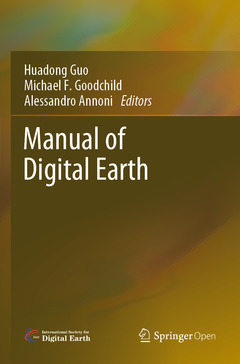Description
Manual of Digital Earth, 1st ed. 2020
Coordinators: Guo Huadong, Goodchild Michael F., Annoni Alessandro
Language: English
Subjects for Manual of Digital Earth:
Keywords
Big Earth Data; Earth Observation; Geospatial Information Infrastructure; Geospatial Information Processing; Geospatial Information Visualization; Artificial Intelligence; Cloud Computing; Internet of Things; Social Media; Citizen Science; Digital Earth for Sustainable Development Goals; Digital Earth for Climage Change; Digital Earth for Disaster Mitigation; Digital Earth Technologies; Digital Earth Applications; Digital Earth Education; Digital Earth Ethics; Open Access; remote sensing/photogrammetry; Climate change management
Publication date: 09-2020
Support: Print on demand
Publication date: 11-2019
Support: Print on demand
Description
/li>Contents
/li>Biography
/li>Comment
/li>
This open access book offers a summary of the development of Digital Earth over the past twenty years. By reviewing the initial vision of Digital Earth, the evolution of that vision, the relevant key technologies, and the role of Digital Earth in helping people respond to global challenges, this publication reveals how and why Digital Earth is becoming vital for acquiring, processing, analysing and mining the rapidly growing volume of global data sets about the Earth.
The main aspects of Digital Earth covered here include: Digital Earth platforms, remote sensing and navigation satellites, processing and visualizing geospatial information, geospatial information infrastructures, big data and cloud computing, transformation and zooming, artificial intelligence, Internet of Things, and social media. Moreover, the book covers in detail the multi-layered/multi-faceted roles of Digital Earth in response to sustainable development goals, climate changes, and mitigating disasters, the applications of Digital Earth (such as digital city and digital heritage), the citizen science in support of Digital Earth, the economic value of Digital Earth, and so on. This book also reviews the regional and national development of Digital Earth around the world, and discusses the role and effect of education and ethics. Lastly, it concludes with a summary of the challenges and forecasts the future trends of Digital Earth.
By sharing case studies and a broad range of general and scientific insights into the science and technology of Digital Earth, this book offers an essential introduction for an ever-growing international audience.Huadong Guo is a Professor of the Chinese Academy of Sciences (CAS) Institute of Remote Sensing and Digital Earth (RADI), an Academician of CAS, a Foreign Member of the Russian Academy of Sciences, a Foreign Member of the Finnish Society of Sciences and Letters, and a Fellow of The World Academy of Sciences for the advancement of science in developing countries (TWAS). He presently serves as President of the International Society for Digital Earth (ISDE), Member of United Nations 10-Member Group to support the Technology Facilitation Mechanism for SDGs, Director of the International Centre on Space Technologies for Natural and Cultural Heritage (HIST) under the Auspices of UNESCO, Science Committee Member of the Integrated Research on Disaster Risk (IRDR) Program of ISC and UNISDR, Chair of the Digital Belt and Road Program (DBAR), and Editor-in-Chief of the International Journal of Digital Earth and Big Earth Data published by Taylor & Francis.He served as President of ICSU Committee on Data for Science and Technology (CODATA), Secretary General of International Society for Digital Earth from 2006 to 2014, Director-General of the CAS Institute of Remote Sensing Applications (IRSA), Founding Director General of the CAS Center for Earth Observation and Digital Earth (CEODE), Founding Director General of the RADI, and Deputy Secretary-General of CAS. Professor Guo specializes in remote sensing science, radar for Earth observation and Digital Earth. He has published more than 600 papers and 16 books, and is the principal awardee of 16 domestic and international prizes. Currently, he is the Chief Scientist of the Big Earth Data Science Engineering Program and the Principal Investigator of Moon-based Earth Observation Research Project supported by CAS and National Natural Science Foundation of China.
Michael F. Goodchild is Emeritus Professor of Geography at the University of California, Santa Barbara. He is also
These books may interest you

Manual of Digital Earth 137.14 €



